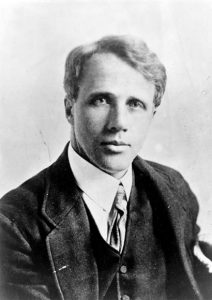Fifth Friend: Robert Frost, "Fire and Ice"
Today, we’ll meet a friend who every American reader will likely already know as the only good New Englander (well, maybe not quite the only, but close), Mr. Robert Frost. Few Americans made it through high school without reading “Mending Wall,” “The Road Not Taken,” or “Nature’s First Green is Gold.” For good reason, too. It’s not hard to see why Mr. Frost’s popularity has endured, as he’s one of the few modern poets to write mostly traditional verse, though his early work is more noticeably Modernist. So, his poems are generally aesthetically pleasant, but still thoughtful, and without the intense introspection that turns off some readers, and certainly without the degenerate form of introspection, the narcissism that marks lesser writers.
Now, for this project I’m using “Fire and Ice,” which I’ve actually memorised previously. In fact, it’s short and with such a strong rhyme scheme that I memorised it essentially by accident, simply after reading it several times:
Some say the world will end in fire,
Some say in ice.
From what I’ve tasted of desire
I hold with those who favor fire.
But if it had to perish twice,
I think I know enough of hate
To know that for destruction ice
Is also great
And would suffice.
I’ve always liked the understatement and dry delivery of this one, but I’m not sure how much we’re supposed to read into this poem or if it is, in fact, completely tongue-in-cheek. I suppose one could use the poem to make a ham-fisted point about the destructiveness of greed and hate, but that reading is rather too obvious for me, and a writer of Mr. Frost’s calibre would, I expect, find a more subtle way of expressing that. So, I’ll keep it short this time, and let this poem stand for itself.
